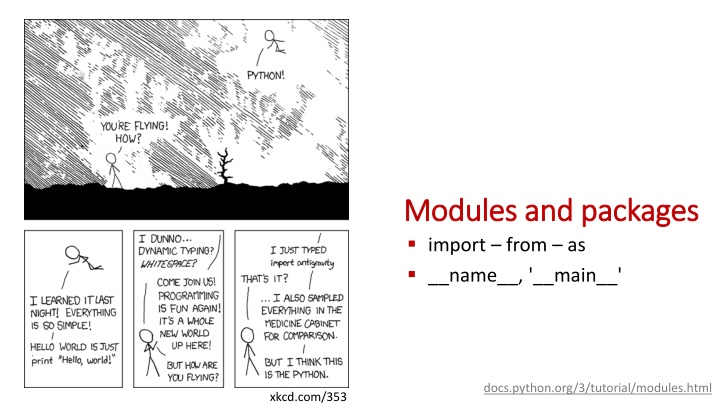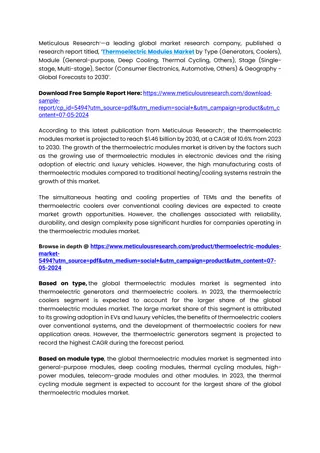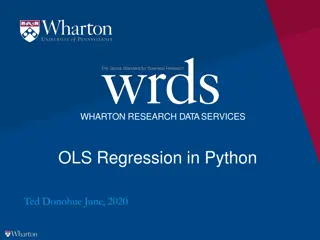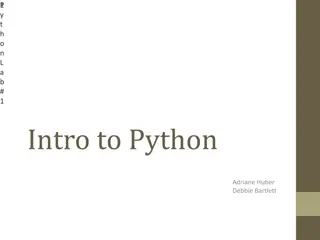Python Modules and Packages Overview
In Python, modules and packages play a crucial role in structuring code into smaller logical units, encapsulating functionality, and promoting code reuse across different programs. This overview covers the basics of defining, importing, and utilizing modules and packages in Python. Additionally, it delves into the significance of Python Standard Library modules and the plethora of existing packages available for leveraging in Python projects.
Download Presentation

Please find below an Image/Link to download the presentation.
The content on the website is provided AS IS for your information and personal use only. It may not be sold, licensed, or shared on other websites without obtaining consent from the author.If you encounter any issues during the download, it is possible that the publisher has removed the file from their server.
You are allowed to download the files provided on this website for personal or commercial use, subject to the condition that they are used lawfully. All files are the property of their respective owners.
The content on the website is provided AS IS for your information and personal use only. It may not be sold, licensed, or shared on other websites without obtaining consent from the author.
E N D
Presentation Transcript
Modules Modules and import from as __name__, '__main__' and packages packages docs.python.org/3/tutorial/modules.html xkcd.com/353
Python Python modules modules and and packages packages A Python module is a module_name.py file containing Python code A Python package is a collection of modules Why do you need modules ? A way to structure code into smaller logical units Encapsulation of functionality Reuse of code in different programs Your can write your own modules and packages or use any of the +400.000 existing packages from pypi.org The Python Standard Library consists of the modules listed on docs.python.org/3/library
Defining Defining and and importing importing a a module module mymodule.py using_mymodule.py '''This is a 'print something' module.''' import mymodule mymodule.the_name() mymodule.print_something(5) from mymodule import print_something print_something(5) from random import randint print('Running my module') def print_something(n): W = ['Eat', 'Sleep', 'Rave', 'Repeat'] words = (W[randint(0, len(W) - 1)] for _ in range(n)) print(' '.join(words)) Python shell | Running my module | __name__ = "mymodule" | Eat Sleep Sleep Sleep Rave | Eat Sleep Rave Repeat Sleep def the_name(): print('__name__ = "' + __name__ +'"') A module is only run once when imported several times
Some Some modules modules mentioned mentioned in the in the course course Module (example functions) Description Module (example functions) Description math (pi sqrt ceil log sin) basic math functools (cache lru_cache total_ordering) higher order functions and decorators random (random randint) random number generator itertools (islice permutations) Iterator tools numpy (array shape) multi-dimensional data collections (Counter deque) datat structures for collections pandas data tables builtins module containing the Python builtins SQLlite SQL database os (path) operating system interface scipy scipy.optimize (minimize linprog) scipy.spatial (ConvexHull) mathematical optimization sys (argv path) system specific functions Tkinter PyQt graphic user interface matplotlib matplotlib.pyplot (plot show style) matplotlib.backends.backend_pdf (PdfPages) mpl_toolkits.mplot3d (Axes3D) plotting data print plots to PDF 3D plot tools xml xml files (eXtensible Markup Language) json JSON (JavaScript Object Notation) files doctest (testmod) unittest (assertEqual assertTrue) testing using doc strings unit testing csv comma separated files openpyxl EXCEL files time (time) datetime (date.today) current time, coversion of time values re regular expression, string searching timeit (timeit) time execution of simple code string (split join lower ascii_letters digits) string functions heapq use a list as a heap
Ways Ways of of importing importing modules modules import.py # Import a module name in the current namespace # All definitions in the module are available as <module>.<name> import math print(math.sqrt(2)) # Import only one or more specific definitions into current namespace from math import sqrt, log, ceil m.py m/__init__.py m/__main__.py print(ceil(log(sqrt(100), 2))) # Import specific modules/definitions from a module into current namespace under new names from math import sqrt as kvadratrod, \ log as logaritme # long import line broken onto multiple lines import matplotlib.pyplot as plt print(logaritme(kvadratrod(100))) # Import all definitions form a module in current namespace # Deprecated, since unclear what happens to the namespace from math import * print(pi) # where did 'pi' come from? Python shell | 1.4142135623730951 | 4 | 2.302585092994046 | 3.141592653589793
__all__ vs vs import * A module can control what is imported by import * by defining __all__ all.py __all__ = ['f'] def f(): print('this is f') def g(): print('this is g') Python shell > min | <built-in function min> > sum | <built-in function sum> > import numpy > numpy.min | <function amin at 0x0000024768E69F30> # numpy.min == numpy.amin > numpy.sum | <function sum at 0x0000024768E69510> > from numpy import * > sum | <function sum at 0x0000024768E69510> # numpy.sum > min | <built-in function min> # builtin min > numpy.__all__ | [..., 'sum', ...] # 'min' is not in list Python shell > import all > all.f() | this is f > all.g() | this is g > from all import * > f() | this is f > g() | NameError: name 'g' is not defined
sqrt_performance.py Performance of Performance of different ways different ways of importing of importing from time import time import math start = time() x = sum(math.sqrt(x) for x in range(10000000)) end = time() print('math.sqrt', end - start) from math import sqrt start = time() x = sum(sqrt(x) for x in range(10000000)) end = time() print('from math import sqrt', end - start) def test(sqrt=math.sqrt): # abuse of keyword argument start = time() x = sum(sqrt(x) for x in range(10000000)) end = time() print('bind sqrt to keyword argument', end - start) test() from math import sqrt appears to be faster than math.sqrt Python shell | math.sqrt 4.05187726020813 | from math import sqrt 3.5011463165283203 | bind sqrt to keyword argument 3.261594772338867
Listing definitions in a Listing definitions in a module module: dir( : dir(module module) ) Python shell > import math > import matplotlib.pyplot as plt > dir(math) | ['__doc__', '__loader__', '__name__', '__package__', '__spec__', 'acos', 'acosh', 'asin', 'asinh', 'atan', 'atan2', 'atanh', 'ceil', 'copysign', 'cos', 'cosh', 'degrees', 'e', 'erf', 'erfc', 'exp', 'expm1', 'fabs', 'factorial', 'floor', 'fmod', 'frexp', 'fsum', 'gamma', 'gcd', 'hypot', 'inf', 'isclose', 'isfinite', 'isinf', 'isnan', 'ldexp', 'lgamma', 'log', 'log10', 'log1p', 'log2', 'modf', 'nan', 'pi', 'pow', 'radians', 'sin', 'sinh', 'sqrt', 'tan', 'tanh', 'tau', 'trunc'] > help(math) | Help on built-in module math: | NAME | math | DESCRIPTION | ... https://docs.python.org/3/library/functions.html#dir
__name__ double.py using_double.py '''Module double.''' def f(x): ''' Some doc test code: >>> f(21) 42 >>> f(7) 14 ''' return 2 * x print('__name__ =', __name__) if __name__ == '__main__': import doctest doctest.testmod(verbose=True) import double print(__name__) print(double.f(5)) Python shell | __name__ = double __main__ 10 The variable __name__ contains the name of the module, or '__main__' if the file is run as the main file by the interpreter Can e.g. be used to test a module if the module is run independently Python shell | __name__ = __main__ ... 2 passed and 0 failed. Test passed.
module module importlib a_constant.py the_constant = 7 Python shell > import a_constant > a_constant.the_constant | 7 > from a_constant import the_constant > the_constant | 7 # Update 7 to 42 in a_constant.py > a_constant.the_constant | 7 > import a_constant > a_constant.the_constant | 7 # unchanged > import importlib > importlib.reload(a_constant) | <module 'a_constant' from 'C:\\...\\a_constant.py'> > a_constant.the_constant | 42 > the_constant | 7 # imported attributes are not updated by reload > from a_constant import the_constant > the_constant | 42 # the new value # import module Implements the import statement (Python internal implementation details) importlib.reload(module) Reloads a previously imported module. Relevant if you have edited the code for the module and want to load the new version in the Python interpreter, without restarting the full program from scratch. # new value not reflected # void, module already loaded # force update
Packages Packages mypackage/__init__.py A package is a collection of modules (and subpackages) in a folder = package name Only folders having an __init__.py file are considered packages The __init__.py can be empty, or contain code that will be loaded when the package is imported, e.g. importing specific modules mypackage/a.py print('Loading mypackage.a') def f(): print('mypackage.a.f') using_mypackage.py import mypackage.a mypackage.a.f() Python shell | Loading mypackage.a | mypackage.a.f
A A package package with a with a subpackage subpackage using_mysubpackage.py import mypackage.a mypackage.a.f() import mypackage.mysubpackage mypackage.mysubpackage.b.g() from mypackage.mysubpackage.b import g g() Python shell | loading mypackage | Loading mypackage.a | mypackage.a.f | loading mypackage.mysubpackage | Loading mypackage.mysubpackage.b | mypackage.mysubpackage.b.g | mypackage.mysubpackage.b.g mypackage/__init__.py print('loading mypackage') mypackage/a.py print('Loading mypackage.a') def f(): print('mypackage.a.f') mypackage/mysubpackage/__init__.py print('loading mypackage.mysubpackage') import mypackage.mysubpackage.b mypackage/mysubpackage/b.py print('Loading mypackage.mysubpackage.b') def g(): print('mypackage.mysubpackage.b.g')
__pycache__ folder folder When Python loads a module the first time it is compiled to some intermediate code, and stored as a .pyc file in the __pycache__ folder. If a .pyc file exists for a module, and the .pyc file is newer than the .py file, then import loads .pyc saving time to load the module (but does not make the program itself faster) It is safe to delete the __pycache__ folder but it will be created again next time a module is loaded
Path to modules Path to modules Python searches the following folders for a module in the following order: 1) The directory containing the input script / current directory 2) Environment variable PYTHONPATH 3) Installation defaults The function path in the modul sys returns a list of the paths
Setting Setting PYTHONPATH from PYTHONPATH from windows set PYTHONPATH=paths separated by semicolon (only valid until shell is closed) windows shell shell
Setting Setting PYTHONPATH from PYTHONPATH from control Control panel > System > Advanced system settings > Environment Variables > User variables > Edit or New PYTHONPATH control panel panel
Python shell > import this | The Zen of Python, by Tim Peters | | Beautiful is better than ugly. | Explicit is better than implicit. | Simple is better than complex. | Complex is better than complicated. | Flat is better than nested. | Sparse is better than dense. | Readability counts. | Special cases aren't special enough to break the rules. | Although practicality beats purity. | Errors should never pass silently. | Unless explicitly silenced. | In the face of ambiguity, refuse the temptation to guess. | There should be one-- and preferably only one --obvious way to do it. | Although that way may not be obvious at first unless you're Dutch. | Now is better than never. | Although never is often better than *right* now. | If the implementation is hard to explain, it's a bad idea. | If the implementation is easy to explain, it may be a good idea. | Namespaces are one honking great idea -- let's do more of those! www.python.org/dev/peps/pep-0020/
heap.py import heapq from random import random module module heapq (Priority Queue) H = [] # a heap is just a list for _ in range(10): heapq.heappush(H, random()) Implements a binary heap (Williams 1964). Stores a set of elements in a standard list, where arbitrary elements can be inserted efficiently and the smallest element can be extracted efficiently while True: x = heapq.heappop(H) print(x) heapq.heappush(H, x + random()) Python shell | 0.20569933892764458 0.27057819339616174 0.31115615362876237 0.4841062272152259 0.5054280956005357 0.509387117524076 0.598647195480462 0.7035150735555027 0.7073929685826221 0.7091224012815325 0.714213496127318 0.727868481291271 0.8051275413759873 0.8279523767282903 0.8626022363202895 0.9376631236263869 heapq.heappush heapq.heappop docs.python.org/3/library/heapq.html J. W. J. Williams. Algorithm 232: Heapsort. Communications of the ACM (1964)
Valid heap Valid heap Python shell > from random import randint > L = [randint(1, 20) for _ in range(10)] > L # just random numbers | [18, 1, 15, 17, 4, 14, 11, 3, 4, 9] > import heapq > heapq.heapify(L) # make L a valid heap > L | [1, 3, 11, 4, 4, 14, 15, 17, 18, 9] > print(heapq.heappop(L)) | 1 > L | [3, 4, 11, 4, 9, 14, 15, 17, 18] > heapq.heappush(L, 7) > L | [3, 4, 11, 4, 7, 14, 15, 17, 18, 9] A valid heap satisfies for all i: L[i] L[2 i +1] and L[i] L[2 i + 2] heapify(L) rearranges the elements in a list to make the list a valid heap J. W. J. Williams. Algorithm 232: Heapsort. Communications of the ACM (1964)
Why Why heapq ? ? min and remove on a list take linear time (runs through the whole list) heapq supports heappush and heappop in logarithmic time For lists of length 30.000.000 the performance gain is a factor 200.000 J. W. J. Williams. Algorithm 232: Heapsort. Communications of the ACM (1964)
heap_performance.py (generating plot on previous slide) import heapq from random import random import matplotlib.pyplot as plt from time import time import gc # garbage collection L = None # avoid MemoryError L = [random() for _ in range(n)] heapq.heapify(L) # make L a legal heap gc.collect() start = time() for _ in range(100000): heapq.heappush(L, random()) x = heapq.heappop(L) end = time() time_heap.append((end - start) / 100000) A B size = [] time_heap = [] time_list = [] for i in range(26): n = 2 ** i size.append(n) plt.title('Average time for insert + delete min') plt.xlabel('list size') plt.ylabel('time (seconds)') plt.plot(size, time_list, 'b.-', label='list (append, min, remove)') plt.plot(size, time_heap, 'r.-', label='heapq (heappush, heappop)') plt.xscale('log') plt.yscale('log') plt.legend() plt.show() by allowing old L to be garbage collected B L = [random() for _ in range(n)] R = max(1, 2 ** 23 // n) gc.collect() start = time() for _ in range(R): L.append(random()) x = min(L) L.remove(x) end = time() time_list.append((end - start) / R) B Avoid out of memory error for largest experiment, A Reduce noise in experiments by forcing Python garbage collection before measurement























